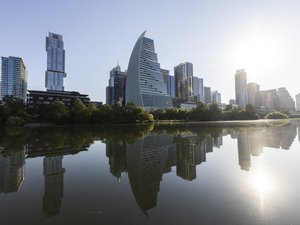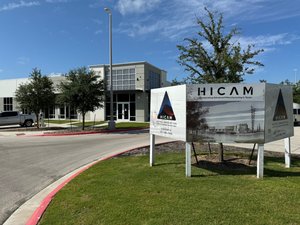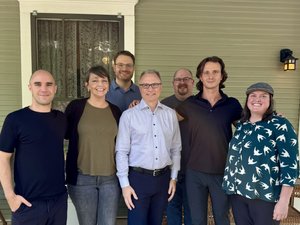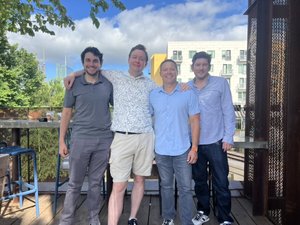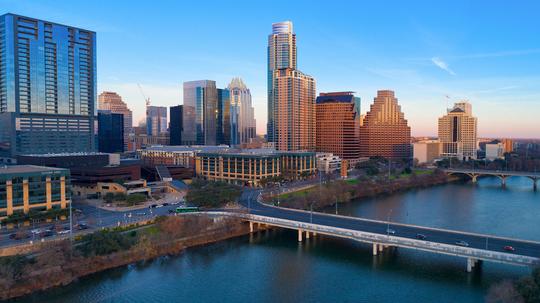
With 2018 fast approaching, it's time to take a look back at the 2017 highlight reel.
From the return of Uber and Lyft to an IPO and a few massive acquisitions, 2017 was a year of exceptional change and growth for many Austin technology startups.
So, let's dive in.
Uber and Lyft Return to Austin
In May, Uber and Lyft reactivated their apps in Austin after a yearlong absence. The San Francisco-based companies shut down in 2016 because they felt Austin's new fingerprint-based background checks were too onerous to continue doing business. In the meantime, smaller ride-hailing startups, including Fasten and Ride Austin, tried to fill the void. But, in May, Texas lawmakers approved new statewide ride-hailing regulations that overruled local laws. The less stringent law led both Lyft and Uber to quickly resume service by Memorial Day, and a few alternative rideshare startups, including Fare and Instaryde, fled the market.
SailPoint IPOs
After about three years without an Austin tech company going public, SailPoint, an ID security software company, in October announced plans to IPO. It debuted on the New York Stock Exchange in November, offering 20 million shares priced at $12. The IPO raised $240 million and gave SailPoint a $1.08 billion market cap.
Amazon Acquires Whole Foods

Whole Foods was an Austin darling that had become one of the best-known grocers in America only to face consumer backlash over its prices, mounting competition from traditional grocers and pressure from activist investors. All the pressure led to Whole Foods being acquired by Amazon in June for $13.7 billion. It was Amazon's largest acquisition to date, and it took one of the city's best known businesses out of local ownership. Since the deal closed, Amazon has been offering some of its devices in Whole Foods grocery stores, and Whole Foods has reduced the price of some of its staple products.
Bumble Becomes a Unicorn

Bumble quickly became one of the most well-known dating apps in 2017, and all the attention for the women-make-the-first-move app reportedly led to some big acquisition offers from Match Group that would put the startup's valuation well north of $1 billion. But it's not just valuation that made Bumble's success story matter. Bumble also represents a win for women-led tech startups, and its founder, Whitney Wolfe Herd, was featured on the cover of Forbes' 30 under 30 issue.
Austin Bids for Amazon's HQ2

Not long after Amazon acquired Whole Foods, the e-commerce giant announced it would build a second North American headquarters. It invited cities across the nation to make their pitch to attract an estimated 50,000 high-paying tech jobs and a $5 billion investment. Austin, which formally submitted its pitch, quickly rose to the top of several lists that hypothesized about where Jeff Bezos might plant his next stake. A decision isn't expected until sometime in 2018. But whichever city it chooses will likely be transformed by the company's presence.
Bazaarvoice Taken Private in Acquisition
In November, Bazaarvoice announced it had agreed to a $521 million buyout by Marlin Equity Partners. The buyout, which is expected to be formalized in early 2018, was the latest twist in what has been a relatively rocky ride for the Austin tech company. Soon after launching, the company experienced a rapid period of growth, followed by an IPO in 2012 that raised $114 million. It then acquired one of its rivals, PowerReviews, for $152 million. But legal troubles hamstrung the company for months, and its stock price suffered.
Google, Facebook, Amazon and Oracle Expand in Austin

In some ways, 2017 was a year of expansions for the local offices of some of the world's biggest companies. Facebook revealed its new digs in June, and it announced that it had grown to more than 700 local employees. In September, Google opened the doors on its new, 450-person office in a new skyscraper downtown. Then, as 2017 was winding down, Oracle finished up its new East Austin campus with plans to bring in 1,500 employees in the first few months of 2018 and hire up to twice that many in coming years. Meanwhile, Amazon expanded its Austin footprint at the Domain, noting that it has grown to about 900 employees.
New VC Funds Emerge
Like many tech hubs outside of the Bay Area, Boston and New York, Austin startups have long complained that the city lacks the access to venture capital to grow quickly and keep up with competitors on the East and West Coasts. Well, in March, Next Coast Ventures, a firm launched in 2016 by former Austin Ventures partner Tom Ball and former tech CEO Mike Smerklo, reported it had secured more than $85 million to invest in startups. Around the same time, Silverton Partners filed papers to raise a new, $100 million fund. In July, LiveOak Venture Partners filed paperwork for a new $110 million fund. And, in September, Austin Ventures General Partner and AVX Partners Founder Chris Pacitti launched a new venture capital called Elsewhere Partners.
Capital Factory Expands as New Accelerators Pop Up
Capital Factory, the city's most well-known accelerator, had a big 2017. It opened a new event space on the first floor of the Omni Building, launched a VR/AR lab and started making trips to Dallas, Houston and San Antonio with hopes of building bridges between each city's startup scene. Meanwhile, in September, MassChallenge launched its accelerator program in Texas, which was followed by a statewide tour. Then, Sputnik ATX launched its accelerator. Techstars announced its impact accelerator would be in Austin. That came as MediaTech Ventures launched, Founder Institute launched and TechRanch shifted gears to work with Impact Hub on an affordable housing accelerator.
RetailMeNot Bought Out
In April, Harland Clarke Holdings Corp. acquired RetailMeNot, one of Austin's biggest tech companies. The deal was worth about $630 million. It took the company, which was founded in 2009 and went public in 2013, back under private control.

